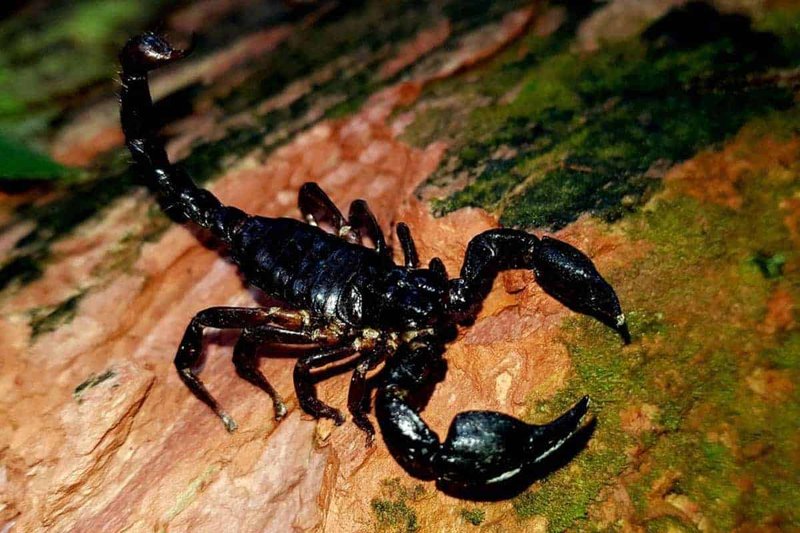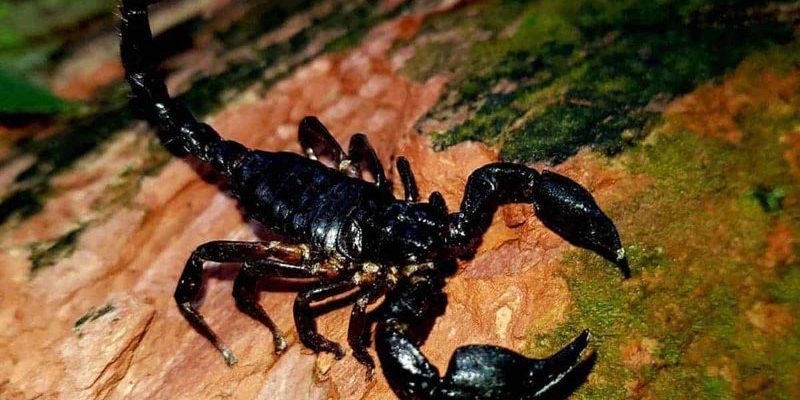
Think of the Asian Forest Scorpion as the introvert of the pet world. They might not be the cuddliest companions like a dog or cat, but they’ll certainly pique your curiosity. Their striking appearance, with a shiny exoskeleton and stinger poised for action, can be mesmerizing to watch. Plus, offering the right habitat and diet can help these creatures thrive in captivity, making them a rewarding pet for the right owner. Let me explain what it takes to care for these fascinating arachnids.
Understanding The Asian Forest Scorpion
Asian Forest Scorpions, particularly the *Heterometrus spinifer*, are one of the most popular scorpion species to keep as pets. Found in the tropical forests of Southeast Asia, these creatures usually grow to about 5-8 inches. Their bodies are black or dark brown, exuding a beautifully polished sheen. But don’t let their intimidating appearance fool you; while they have venom, it’s usually mild and not deadly to humans. This characteristic make them an ideal choice for pet enthusiasts.
These scorpions are nocturnal, meaning they’re most active during the night, lurking and hunting for food. It’s like they have their secret world that you can peek into during the evenings! In nature, they often dwell in burrows or under leaf litter, which is essential to understand when you’re setting up a proper habitat for your pet.
Setting Up The Perfect Habitat
Setting up a suitable habitat for your Asian Forest Scorpion is crucial. They thrive in humid, warm environments, so mimicking their natural habitat is the key to their comfort. Here’s what you’ll need:
- Enclosure: A 10-gallon tank is typically sufficient. Ensure it’s well-ventilated but escape-proof.
- Substrate: Use coconut fiber or peat moss about 3-4 inches deep. This depth allows scorpions to burrow, which they love.
- Humidity and Temperature: Keep the humidity around 70-80% and the temperature between 75-85°F. A simple heat mat can work wonders for this.
- Hide Spots: Add pieces of bark, rocks, or commercial hides. These give your scorpion places to feel safe.
Adding some live plants can also improve the habitat’s aesthetic and help maintain humidity levels. Just make sure they’re non-toxic! Honestly, creating this little slice of the jungle for your scorpion can be an enjoyable project.
Feeding Your Asian Forest Scorpion
Diet is another critical aspect of scorpion care. Asian Forest Scorpions are carnivorous and primarily eat insects. Here’s how to ensure your scorpion is well-fed and healthy:
- Live Food: They enjoy crickets, mealworms, and roaches. These insects should be appropriately sized — ideally, no bigger than the scorpion’s claw width.
- Feeding Schedule: Offering food about once every week is usually enough. Be sure to remove uneaten food after 24 hours to prevent mold and bacteria.
- Supplements: Dusting insects with a calcium supplement every so often can benefit their health, especially during molting periods.
You might be wondering how often they eat. Generally, they can go quite a while without food, and overfeeding can lead to health problems. A good rule of thumb is to monitor their weight and overall behavior—if they seem lethargic or their exoskeleton looks too full, it might be time to cut back a bit.
Caring For Your Scorpion’s Health
Just like any pet, keeping your Asian Forest Scorpion healthy is crucial. Here are a few pointers to keep in mind:
- Molting: Scorpions undergo molting to grow. During this time, they become vulnerable, so keep them away from handling. You’ll see them shed their exoskeleton, which can occasionally be alarming but is perfectly normal.
- Watch for Signs of Stress: If your scorpion is acting lethargic, not eating, or is overly active, these could indicate stress. Reassess their habitat and feeding routines.
- Cleaning and Maintenance: Regularly clean the enclosure, ensuring it’s free of waste and mold. A monthly deep clean is a good habit, but make sure to handle your scorpion with care during this time.
You know, being attentive to these small details can make a huge difference in your scorpion’s life. Just like any relationship, consistent care goes a long way!
Handling Your Asian Forest Scorpion
If you’re itching to hold your scorpion, it’s essential to understand how to do it safely. While Asian Forest Scorpions can be handled, it’s best to approach this with caution. Here’s how to make the experience as safe as possible:
- Let Them Adjust: After bringing your scorpion home, give it a few weeks to settle in before trying to handle it.
- Use Tongs: If you need to move your scorpion, consider using feeding tongs. This minimizes the risk of being stung and makes the process less stressful for your pet.
- Slow Movements: If you decide to hold them, make slow, gentle movements. Remember, they aren’t like dogs or cats; they can feel threatened easily.
Honestly, handling scorpions should be more about enjoying their presence rather than treating them like a typical pet. They’re unique in their own way, and a respectful admiration can go a long way.
The Commitment of Owning an Asian Forest Scorpion
Bringing an Asian Forest Scorpion into your life isn’t just a hobby; it’s a commitment. They can live for several years—sometimes even over a decade—with proper care. This means you’ll need to be ready for the long haul.
Consider how their presence fits into your lifestyle. If you often travel or are away from home frequently, you might want to rethink whether a scorpion is right for you. While they don’t require as much attention as some pets, they still need consistency in their environment and care.
Furthermore, it’s essential to research and connect with other scorpion owners. They can provide valuable insights, tips, and tricks for making your scorpion care game stronger. Plus, the online community can be a fun way to share your experiences and learn from others!
Keeping an Asian Forest Scorpion as a pet can be an exciting journey full of learning and discovery. These creatures offer a unique glimpse into a world that most people don’t get to see. By providing them with the right habitat, diet, and care, you can form a bond with your scorpion that’s both fascinating and rewarding. Remember, it’s all about understanding their needs and creating an environment where they can thrive. You’ll not only be a scorpion owner but also a caretaker of a little piece of the wild right in your living room!

